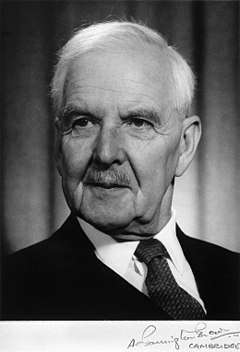Rudolph Peters
| Sir Rudolph Albert Peters | |
|---|---|
 | |
| Born |
13 April 1889 Kensington, London, UK |
| Died | 29 January 1982 (aged 92) |
| Nationality | British |
| Awards |
Royal Medal (1949) FRS (1935)[1] |
Sir Rudolph Albert Peters MC MID FRS[1] HFRSE FRCP LLD (13 April 1889 – 29 January 1982) was a British biochemist. He led the research team at Oxford who developed British Anti-Lewisite (BAL), an antidote for the chemical warfare agent lewisite. His efforts investigating the mechanism of arsenic war gases were deemed crucial in maintaining battlefield effectiveness.[2]
Life
He was born in Kensington in London the son of Dr Albert E. D. R. Peters (1863-1945), a physician, and his wife, Agnes Malvina Watts (1867-1950).[3]
He was educated at Wellington College, Berkshire, then studied Medicine at King's College London and Gonville and Caius College, Cambridge.[4]
In the First World War he served in the Royal Army Medical Corps as Medical Officer to the 60th Rifles. From 1917 he was attached to the chemical warfare section at Porton Down. After the war he returned to Cambridge University lecturing in Biochemistry. In 1923 he was created Professor of Biochemistry at Oxford University.
After the Second World War, he researched pyruvate metabolism, focussing particularly on the toxicity of fluoroacetate. The fact that fluoroacetate in itself is far less toxic than its metabolite fluorocitrate led him to coin the term "lethal synthesis" which was the title of his Croonian Lecture of 1951.[2][5]
When he retired from academia in 1954 he became Head of the Institute of animal Physiology at Babraham Hall near Cambridge.
He was elected a FRS in 1935. He was knighted by Queen Elizabeth II in 1952 and elected an Honorary Fellow of the Royal Society of Edinburgh in 1957.
He died on 29 January 1982.
Family
In 1917 he married Frances Verel.
References
- 1 2 Thompson, R. H. S.; Ogston, A. G. (1983). "Rudolph Albert Peters. 13 April 1889-29 January 1982". Biographical Memoirs of Fellows of the Royal Society. 29: 494. doi:10.1098/rsbm.1983.0018. JSTOR 769811.
- 1 2 Anon (1982). "Obituary". BMJ. 284 (6315): 589. doi:10.1136/bmj.284.6315.589.
- ↑ Biographical Index of Former Fellows of the Royal Society of Edinburgh 1783–2002 (PDF). The Royal Society of Edinburgh. July 2006. ISBN 0 902 198 84 X.
- ↑ ‘PETERS, Sir Rudolph (Albert)’, Who Was Who, A & C Black, an imprint of Bloomsbury Publishing plc, 1920–2016
- ↑ Peters, R. A. (1952). "Croonian Lecture: Lethal Synthesis". Proceedings of the Royal Society B: Biological Sciences. 139 (895): 143–170. Bibcode:1952RSPSB.139..143P. doi:10.1098/rspb.1952.0001.
Further reading
- "Sir Rudolph Albert Peters, Biochemist (1889–1982)". Australian Postal History & Social Philately.